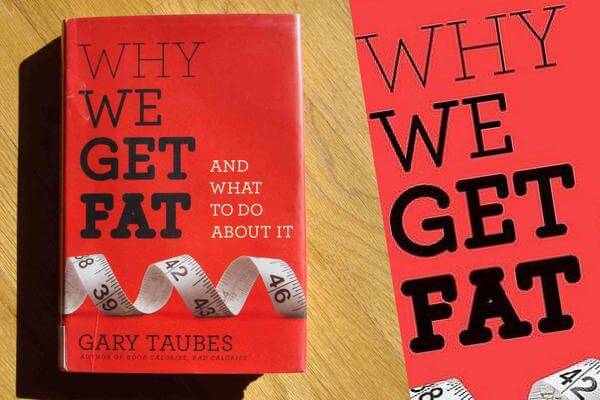If you’re ready to have your ideas of why we are fat questioned, with some history and science thrown in, then buckle up and enjoy this read. Gary Taubes’ book Why We Get Fat: And What To Do About It is a more “layperson” friendly adaptation of his almost 600-page book Good Calories, Bad Calories that goes into great detail on why the obesity dilemma we are facing today is not because people are lazy and over indulge. It’s not because of the prosperity theory, in which increased prosperity leads to overeating and obesity. Taubes challenges these popular beliefs and instead focuses on insulin’s responsibility in the obesity problem we face today, as well as other hormones and enzymes.
What’s Inside
Taubes looks at the obesity issue from the standpoint that those that are fat have been internally regulated to be such and this regulation causes the overeating and sedentary lifestyle. He actually offers several examples within his book on how it can’t possibly be just “calories-in calories-out” that makes us fat. Look at populations that are incredibly poor, with little access to food, who work jobs that demand physical exercise. Some of them are obese while others are underweight consuming the same foods in very minimal quantities. With the impoverished nations aside, let’s focus on an example that is more representative of the obesity issue plaguing developed countries. He offers the example of the Fat Louisa Paradox…
Back in 1846, the Perma tribe was thriving. They were hunters, farmers, gatherers, and herded cattle. They had an abundance of food. So much so that when the gold rush happened in the United States the government asked this tribe to supply food to settlers. By all accounts, one could say they were prosperous. Then more settlers came to the area and over hunted, diverted the rivers/streams, and the Perma Tribe lost their food sources. By 1902 the tribe was living in poverty, with very little food (most coming from government rations). This tribe now had significantly less calories than they once were accustomed to as well as a shift in the types of food they were eating. Yet the tribe collectively had gained weight. They went from muscular and lean to obese. This was just one of the many examples given to disprove the prosperity theory and to make you think, “if not that, then what?”.
What We Like
So if we are to believe Taubes, and our bodies control whether or not we get fat, are we just slaves to our hormones that regulate how we use energy (calories)? Not fully, luckily you can control at least one very crucial hormone, insulin. How, do you control insulin you ask? Restricting carbohydrates. Your insulin levels are primarily controlled based upon your intake of carbohydrates (this is extremely simplified but gets the point across for this book review).
The author believes that most things can be controlled by controlling our insulin levels through carbohydrate restriction, which we agree with. But, he also believes that calorie restriction is unnecessary.
Room for Improvement
As we have talked about in other articles, your macronutrients do play a vital role in insulin control (too many calories in the form of fats or protein can cause an insulin response which equates to an increase in insulin). Have you ever heard someone say I lost a good deal of weight on the keto diet in the beginning but then stopped losing weight? This is generally due to too many calories in the form of too much protein or fat that doesn’t match your body’s needs. And while we do agree that our problems with obesity are not going to be solved merely with calories-in calories-out, we also believe it plays a substantial supporting role, especially if the calories come from carbohydrates vs fats.
Gary Taubes is not a scientist, although he does have a degree in physics from Harvard and a graduate degree from Stanford in engineering as well as a graduate degree in journalism from Columbia. Why do we mention this? Well, while he does cite some research, he tends to cite only research that supports his theories and views. He even states in the book, “one problem here is that when people, experts or not, decide to review the evidence on an issue dear to their hearts (me included), they tend to see what they want to see. This is human nature, but it doesn’t lead to trustworthy conclusions.”
The Final Word
So does this mean that his book is not a good resource? Absolutely not. At the very least it gives you a history of how nutrition has evolved and how many experts/government agencies/companies with conflicting interests have shaped the current dietary standards and recommendations. And it may nudge you to look further into the issues and research. For encouraging readers to learn how carbohydrates/sugar/insulin play a vital role in the obesity issues we are facing today and not just calories-in vs calories-out, we consider this a must read.



